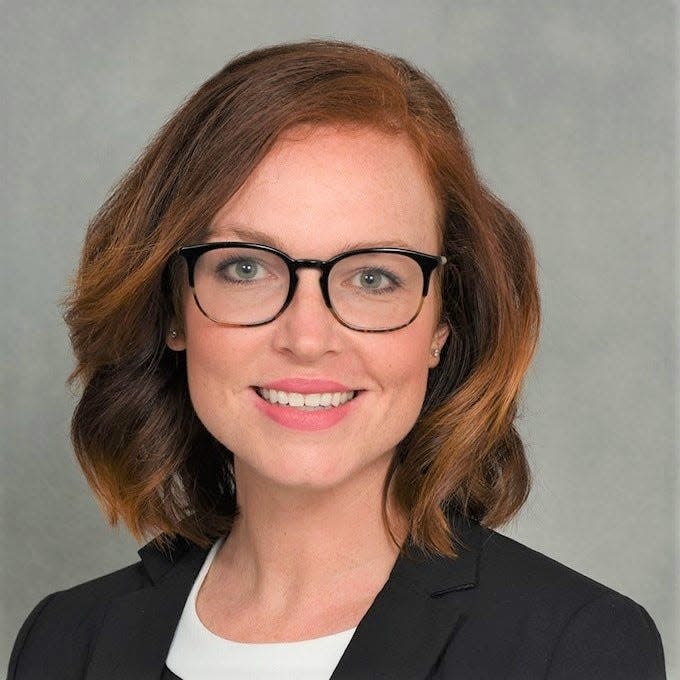Opinion: Kids often asked about abuse for first time in courtroom
It's a heartbreaking and consistent reality. Many abused and neglected children go unnoticed until they themselves act out and come to the Juvenile Court.
Numerous studies link early child abuse and neglect to later involvement in the juvenile justice system. That means it's when they’re sitting in a courtroom like mine that children are asked, often for the first time, about abuse.
Too often, we are using a child's delinquent and criminal behavior to finally address the impact of child abuse. It must, for every single child, begin sooner.
April is Child Abuse Prevention Awareness Month. Last year alone, Hamilton County Jobs & Family Services, reports serving more than 24,000 children and families and answering more than 51,000 hotline calls. In Hamilton County Juvenile Court , we heard just over 1,300 cases of abuse, neglect or dependency.
As a Juvenile Court judge, I can tell you that in nearly every background report I receive for each child that appears in my courtroom, there is a reference to childhood trauma. Whether physical abuse, neglect from parents, abandonment, exposure to addiction and violence, or the evergreen effects of poverty. It's so common that we expect past trauma to be a characteristic of the kids we serve. We train our staff on trauma-informed responses so that we can try to resolve what is going on inside our kids, in an effort to help them live safe, happy lives.
In addition to being crime victims themselves and/or having a case with the JFS/241-KIDS system, many children have seen parents or caregivers abuse one another. Witnessing violence as a child is itself a form of child abuse, leaving emotional scars that no one sees. Imagine what it feels like for a child to sit in my courtroom charged with a juvenile offense, their abuser present. The child is thinking, I can't tell this judge what's going on at home. The person who is supposed to be protecting me is hurting me. They're sitting right behind me and I know what will happen to me if I tell.
The kids we see in court are in an untenable situation, making choices from minute to minute for survival, because at their greatest time of need, when they were very little, we didn't protect them. And we didn't protect them because we didn't know or because everything on the outside looked fine.
There is no easy or all-inclusive fix to prevent child abuse and neglect. What we want people to know is that it is always OK to be a safe adult for children. It should be an expectation that children have adults they can trust and those adults don't have to be a blood relative. So often I hear about the days when kids behaved because they knew if they didn’t, someone would call their parents. Those days are gone, replaced with kids going from home to home, falling into relationships on the streets with predators who claim to care and look out for them.
And for parents and care givers who are stressed and may have been abused children themselves, know that it's OK to ask for help and support. Adults in the most ideal circumstances reach a breaking point. If you're struggling to pay bills, put food on the table, and take care of your own mental health, it's even harder to control your emotions, to snap, and take your own frustrations out on your children.
Our number one goal should be raising healthy, happy children. That means keeping them safe from all types of harm as well as providing the basics, food, shelter, clothing and education. For most of us, that goal is a foregone conclusion. For too many, though, hunger and safety are real concerns.
We all need to invest in our kids. Let's commit to being neighbors who check on neighbors, co-workers who acknowledge the effects of stress surfacing in our colleagues, teachers and coaches who listen to and believe children. We need trusted adults to serve as mentors for both children and parents. The court is here to provide guidance and support to anyone who wants to step up to help kids.
Here are some resources to assist children who may be suffering abuse or neglect, and parents/caregivers who are dealing with stress factors that may lead to an abusive situation:
JFS is promoting #OneSmallThing people can do during the month of April. Visit the JFS page for daily resources.
Children’s Services operates Hamilton County's 24-hour child abuse hotline, (513) 241-KIDS (5437)
Positive Parenting Programs (Triple P) is a national organization that helps parents manage challenges with their children
Beechacres Parenting Center is a local agency that offers innovative solutions to help adults meet the needs of the children in their lives.
Not sure when to intervene? This article may help: Recognizing the difference between discipline and abuse
Kari Bloom is administrative judge for Hamilton County Juvenile Court.

This article originally appeared on Cincinnati Enquirer: Opinion: Kids often asked about abuse for first time in courtroom

